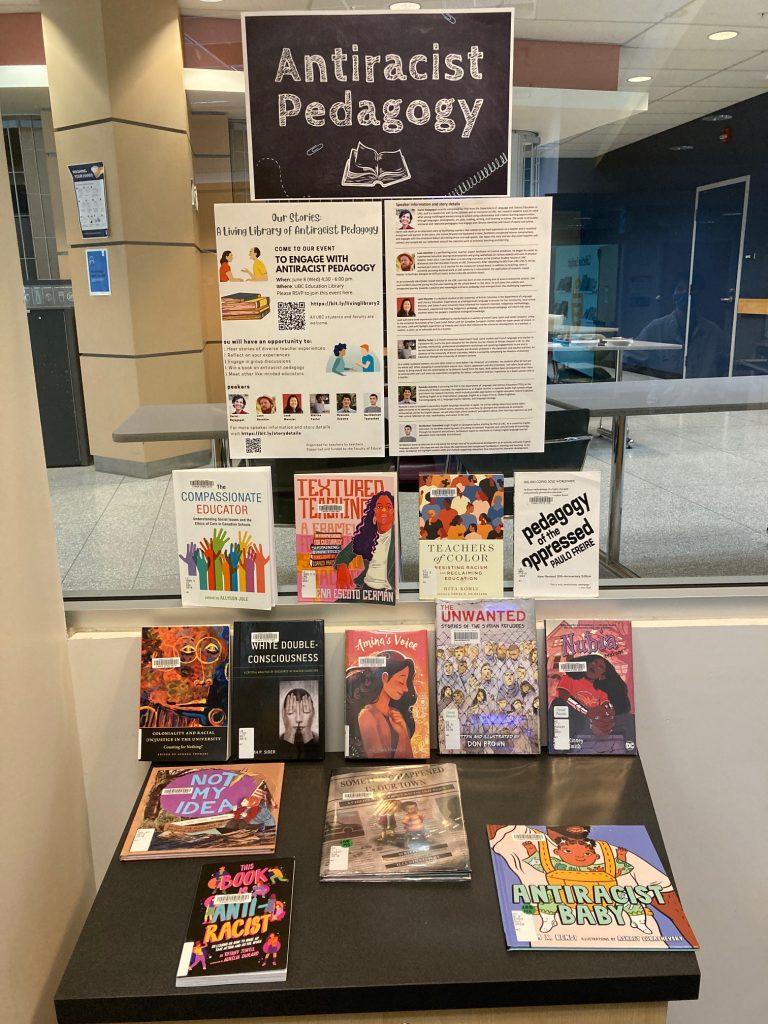Stay up to date on news, events and special features.
Science Literacy Week 2022
From geometry to financial literacy, UBC Education Library math books are on display now for Science Literacy Week 2022. This year’s theme is mathematics.
Welcome to UBC Education Library! Collection Spotlight: Books for New Teachers
Welcome to UBC Education Library!
This month’s Collection Spotlight is “Books for New Teachers.”
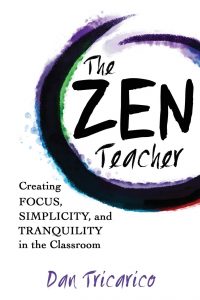 Zen teacher: creating focus, simplicity and tranquility in the classroom
Zen teacher: creating focus, simplicity and tranquility in the classroom
Dan Tricarico.
LB2840 .T75 2015
You can thrive in the classroom. All it takes are a few moments of peace and a little focus. If you’re like many teachers, your day is busy, demanding, even chaotic. But just because you live in a fast-paced, always-on world, doesn’t mean your life has to feel rushed and crazy. In The Zen Teacher, educator, blogger, and speaker Dan Tricarico provides practical, easy-to-use techniques to help teachers slow down and create a sense of focus, simplicity, and tranquillity in the classroom – and in life. As a teacher, you have incredible power to influence, even improve, the future. By being at your best – unrushed and fully focused – you ensure that every interaction with your students is beneficial, for them and for you. If you’re new to the concept of Zen, don’t worry. In this introductory guide, Dan Tricarico explains what it means to develop a Zen practice – something that has nothing to do with religion and everything to do with your ability to thrive in the classroom. The Zen Teacher will help you: Maximize your performance while lowering your stress. Transform your classroom and experience a better quality of life. Focus on things that really matter and let go of things you can’t control. Find time to take care of yourself, so you can be at your best!
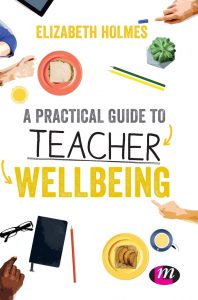 A practical guide to teacher wellbeing
A practical guide to teacher wellbeing
Elizabeth Holmes.
LB2840.2 .H645 2019
Teacher wellbeing, or a lack of it, is a major concern for the teaching profession. Research shows that there is a recruitment and retention crisis with over a third of the school, FE and HE profession expecting to leave by 2020.
This is a practical guide that will help trainee teachers prepare for what is, undoubtedly, a demanding job. It supports new teachers to be aware of themselves and to understand the schools and teaching sector so they better anticipate pressures and find their own way forward.
With solutions and strategies that can be taken into practice, this guide will help new and early career teachers establish that all-important work/life balance and avoid burnout.
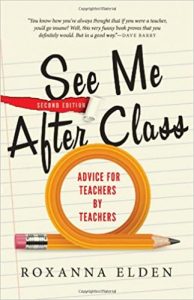
See me after class: advice for teachers by teachers
Roxanna Elden. (Great Reads)
LB2844.1.N4 E43 2013
The Most Dog-Eared “Teacher’s Edition” You’ll Have in Your Classroom
Teaching is tough. And teachers, like the rest of the population, aren’t perfect. Yet good teaching happens, and great teachers continue to inspire and educate generations of students. See Me After Class helps those great teachers of the future to survive the classroom long enough to become great.
Fueled by hundreds of hilarious—and sometimes shocking—tales from the teachers who lived them, Elden provides tips and strategies that deal head-on with the challenges that aren’t covered in new-teacher training. Lessons can go wrong. Parents may yell at you. Sunday evenings will sometimes be accompanied by the dreaded countdown to Monday morning. As a veteran teacher, Elden offers funny, practical, and honest advice, to help teachers walk through the doors of their classrooms day after day with clarity, confidence…and sanity!
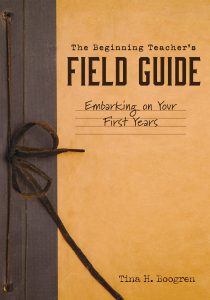 The beginning teacher’s field guide: embarking on your first years
The beginning teacher’s field guide: embarking on your first years
Tina H. Boogren.
LB2844.1.N4 B658 2018
The joys and pains of starting a teaching career often go undiscussed. This field guide dives deep into the personal side of teaching, offering crucial advice, empathy, and new-teacher support. The author details six phases every new or first-year teacher goes through (anticipation, survival, disillusionment, rejuvenation, reflection, and second anticipation) and outlines targeted classroom strategies, teaching tips, and self-care practices for each.
Transcend the emotional, mental, and physical problems teachers face in the classroom:
- Understand the feelings and teaching challenges of each phase during a beginning teacher’s career.
- Practice self-care to combat beginning and first-year teacher stress and burnout; avoid the mental pitfalls that so often lead to teachers changing careers.
- Learn effective classroom-management strategies for new teachers and how to maintain positive relationships with students.
- Respond to prompts that will help you process and reflect on your first years’ culmination.
- Utilize the prompts and journaling spaces throughout the book to reflect on your professional improvements and successes.
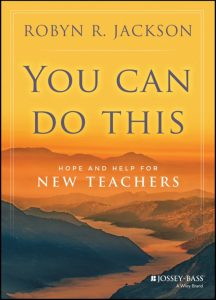
You can do this: hope and help for new teachers
Robyn R. Jackson.
LB1025.3 .J334 2014
In this down-to-earth, inspirational book, bestselling author Robyn Jackson offers encouragement and real-world advice for navigating those difficult years as a beginning teacher. Sharing stories from her own humbling first years as a new teacher, Robyn helps you tackle challenges such as motivating students, planning effective lessons, building relationships with parents, bouncing back from embarrassing mistakes, and finding your own authority as a teacher. She also helps you find success outside the classroom with practical pointers for living on a teacher’s salary and carving out time to have a life of your own. With candour and a good deal of wit, she gently guides you to develop your own teaching style and, ultimately, to find your own path toward mastery.
Robyn speaks to new educators as a trusted mentor, one who knows how to navigate the tricky terrain of “new teacherdom”—and knows how rich and rewarding the payoff will be. If you’re new to the profession or know someone about to embark on a teaching career, You Can Do This is the essential roadmap to succeeding as a new educator both inside and outside the classroom.
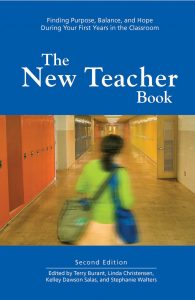 The new teacher book: finding purpose, balance, and hope during your first years in the classroom
The new teacher book: finding purpose, balance, and hope during your first years in the classroom
edited by Terry Burant [and others].
LB2844.1.N4 N476 2010
Teaching is a lifelong challenge, but the first few years in the classroom are typically among a teacher’s hardest. Since The New Teacher Book first came out in 2004, it has become an invaluable resource for new teachers entering the classroom.
This expanded collection of writings and reflections – some by new teachers, others by veterans with decades of experience to share – offers practical guidance on how to effectively navigate the school system, form rewarding professional relationships with colleagues, and connect in meaningful ways with students and families from all cultures and backgrounds.
The New Teacher Book will help new teachers, from kindergarten through high school, sustain the passion and ideals that led them to teaching, and channel that energy into the day-to-day reality of working in a school.
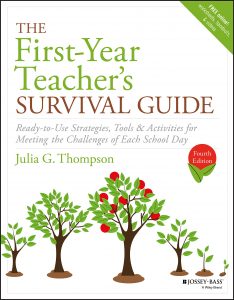
The first-year teacher’s survival guide: ready-to-use strategies, tools & activities for meeting the challenges of each school day
Julia G. Thompson
ONLINE
The updated Fourth Edition of the Award-Winning Book that Offers Beginning Educators Everything They Need in Order to Survive and Thrive! Designed for new educators, this award-winning book covers the basic strategies, activities, and tools teachers need to know in order to succeed in the classroom. Now it its fourth edition, The First-Year Teacher’s Survival Guide contains new and updated material on essential topics including: classroom management (how to prevent or minimize disruptions), sustaining professional growth, differentiated instruction, nurturing a growth mindset, and much more. The fourth edition also offers downloadable forms and worksheets, and video instruction on key topics. In addition, this must-have guide: Offers ideas for dealing with homework and instructional concerns from parents and guardians Includes suggestions for helping new professionals maintain a successful work-life balance Contains guidelines to classroom technology and ideas for using digital tools to create engaging lessons Proposes proven strategies for forging positive, supportive relationships with students Presents recommendations for successfully managing the most common discipline problems This must-have guide is filled with the information and tips new teachers need in order to face classroom situations with confidence.
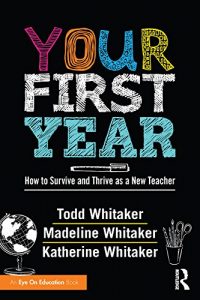 Your first year: how to survive and thrive as a new teacher
Your first year: how to survive and thrive as a new teacher
Todd Whitaker
ONLINE
Learn all the essentials for making your first year of teaching a success! In this exciting new book, internationally renowned educator Todd Whitaker teams up with his daughters—Madeline, an elementary teacher, and Katherine, a secondary teacher—to share advice and inspiration. They offer step-by-step guidance to thriving in your new role and overcoming the challenges that many new teachers face. Topics include: Learning classroom management skills such as building relationships and maintaining high expectations and consistency Setting up your classroom and establishing procedures and rules Planning effective lessons and making your instructional time an engaging experience Managing your own emotions in the classroom and dealing effectively with misbehaviour Working with peers, administrators, and parents to build support and foster collaboration The book is filled with specific examples and vignettes from elementary, middle, and high school classes, so you’ll gain helpful strategies no matter what grade level and subject area you teach. You’ll also find out how to make tweaks or hit the “reset” button when something isn’t going as planned. Things may not always go perfectly your first year, but the practical advice in this book will help you stay motivated on the path to success!

101 answers for new teachers and their mentors: effective teaching tips for daily classroom use
Annette Breoux
ONLINE
Being a new teacher is not easy. This bestseller from renowned educator Annette Breaux is THE book that teachers need to get through their first year!
The book answers all the questions on new teachers’ minds, such as:
-How do you actually manage a classroom of students?
-How do you get them to care?
-How do you find time to plan your lessons, grade student work, attend meetings, and communicate with parents?
Annette addresses these issues (and many, many more!) with practical strategies and heartfelt advice. New to the third edition is a special section on teaching amidst growing concerns over high-stakes assessments and standards.
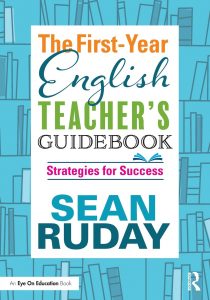 The first-year English teacher’s guidebook: strategies for success
The first-year English teacher’s guidebook: strategies for success
Sean Ruday
ONLINE
“The First-Year English Teacher’s Guidebook offers practical advice and recommendations to help new English teachers thrive in the classroom. Each chapter introduces a concept crucial to a successful first year of teaching English and discusses how to incorporate that concept into your daily classroom practice. You’ll find out how to: – Clearly communicate instructional goals with students, parents, and colleagues; – Incorporate students’ out-of-school interests into the curriculum; – Use assignment-specific rubrics to respond to student writing in meaningful ways, – Integrate technology into ELA instruction; – Conduct student-centred writing conferences; – Make time for self-care and self-improvement; – and much, much more. Additionally, the guidebook provides a number of forms, templates, graphic organizers, and writing prompts, that will enable you to put the author’s advice into immediate action. These tools are available for download on the book’s product page: www.routledge.com”
 Progress plain and simple: what every teacher needs to know about improving pupil progress
Progress plain and simple: what every teacher needs to know about improving pupil progress
Michael Harpham.
ONLINE
What is progress in learning? How do we see progress being made in a lesson? This book offers a fresh perspective on teaching, learning and progress in the classroom. Written by an experienced teacher and school leader, Michael Harpham, it explores the different ways in which progress can be made in the classroom and how it can be more effectively delivered, identified, evidenced, measured and assessed.
The book provides an overview of progress in schools for both teachers and school leaders, including what is meant by progress and what it looks like in lessons, as well as its implications on assessment, leadership, and internal and external school evaluation. It offers over thirty situation-driven strategies and activities to help develop and deliver progress in and beyond the classroom, focussing on five measures: Skills Knowledge Accuracy Resilience Independent learning Full of tips to help improve progress in schools, this is essential reading for all teachers, school leaders and parents.
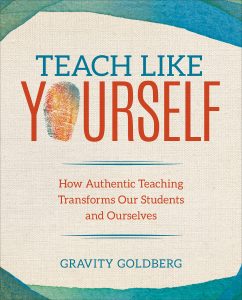
Teach like yourself: how authentic teaching transforms our students and ourselves
Gravity Goldberg.
LB1025.3 .G647 2019
This book helps you be the biggest, boldest, and most powerful version of your teacher self. It reminds you why you became a teacher and coaches you to bring your unique gifts and talents into the classroom. The difference between a so-so lesson and one that leaves a lasting impact on students has everything to do with how confident and connected you feel to yourself and your students.
Read this book when you need an extra shot of bravery. It’s a perfect resource if
- You want to coach yourself into fulfilling your teacher potential
- You are looking for more balance in your teaching and personal life
- You want a pep talk for saying no to what doesn’t help students and yes to what you know does
- You want to grow and deepen your practice without losing yourself in the process
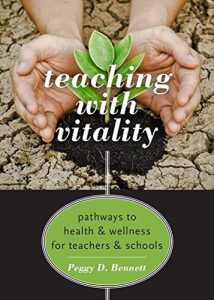 Teaching with vitality: pathways to health and wellness for teachers and schools
Teaching with vitality: pathways to health and wellness for teachers and schools
Peggy D. Bennett.
LC210 .B46 2018
Perhaps more than any other experience, conflict in schools and workplaces can zap our energy and steal our vigour as teachers. If we knew ways to minimize conflict and maximize vitality, would we use them? Teaching with Vitality offers specific behaviours and attitudes to reframe conflict by diluting and dissolving it.
Organized into brief topics for busy readers, Teaching with Vitality combines common experiences and practical options for lessening the turmoil that is inevitable in schools. As beneficent stewards of our children, educators are priceless contributors to the quality of our lives.
The main goal of Teaching with Vitality is to elevate teachers in their day-to-day lives by deconstructing the major and minor conflicts that sap their peace and dampen their power. School wellness is contagious. And, this book aims to offer daily pathways to health, wellness, and vigour.
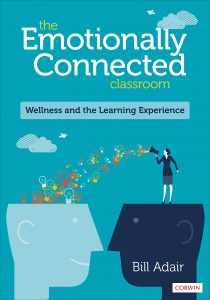 The emotionally connected classroom: wellness and the learning experience
The emotionally connected classroom: wellness and the learning experience
Bill Adair.
LB1072 .A36 2019
Bill Adair is a teacher with 28 years of experience in the Coquitlam school district outside of Vancouver, British Columbia. His primary teaching areas have been high school mathematics, physical education, and leadership. Leadership roles have included positions as athletic director, coach, student activities facilitator, and liaison with community and college programs. After six years of research, consultation with addiction specialists, experimentation and practice in the classroom, presentations, workshops, and multiple refinements, he has created this exciting book and educational model. Bill has been conducting teacher workshops related to British Columbia’s new whole child curriculum implementation. Faculty associates at Simon Fraser University have taken note of successful teacher candidates using the model. Connected Classroom workshops have been held for teachers in training and more are scheduled for future classes. It is my hope that publication of this book will increase opportunities for workshops and speaking engagements. As I approach the close of a successful and rewarding educational career, becoming part of the Corwin consultant team would play an important role in sharing a passion for better teaching, learning, and living”–
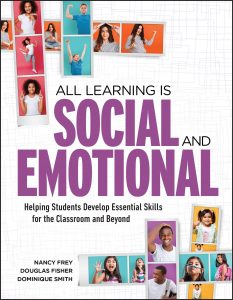 All learning is social and emotional: helping students develop essential skills for the classroom and beyond
All learning is social and emotional: helping students develop essential skills for the classroom and beyond
Nancy Frey, Douglas Fisher, Dominique Smith.
LB1072 .F74 2019
If you teach kids rather than standards, and if you want all kids to get what they need to thrive, Nancy Frey, Douglas Fisher, and Dominique Smith offer a solution: a comprehensive, five-part model of SEL that’s easy to integrate into everyday content instruction, no matter what subject or grade level you teach.
You’ll learn the hows and whys of * Building students’ sense of identity and confidence in their ability to learn, overcome challenges, and influence the world around them. * Helping students identify, describe, and regulate their emotional responses. * Promoting the cognitive regulation skills critical to decision making and problem-solving. * Fostering students’ social skills, including teamwork and sharing, and their ability to establish and repair relationships. * Equipping students to become informed and involved citizens.
 Teaching in the fast lane: how to create active learning experiences
Teaching in the fast lane: how to create active learning experiences
Suzy Pepper Rollins.
LB1027.23 .R65 2017
Teaching in the Fast Lane offers teachers a way to increase student engagement: an active classroom. The active classroom is about creating learning experiences differently, so that students engage in exploration of the content and take on a good share of the responsibility for their own learning. It’s about students reaching explicit targets in different ways, which can result in increased student effort and a higher quality of work.
Author Suzy Pepper Rollins details how to design, manage, and maintain an active classroom that balances autonomy and structure. She offers student-centered, practical strategies on sorting, station teaching, and cooperative learning that will help teachers build on students’ intellectual curiosity, self-efficacy, and sense of purpose.
Using the strategies in this book, teachers can strategically “let go” in ways that enable students to reach their learning targets, achieve more, be motivated to work, learn to collaborate, and experience a real sense of accomplishment.
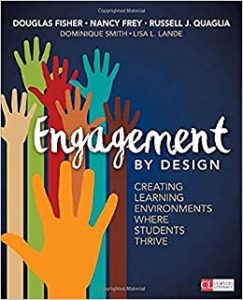
Engagement by design: creating learning environments where students thrive
Douglas Fisher, Nancy Frey, Russell J. Quaglia, Dominique Smith, Lisa L. Lande.
LB1033 .F53 2018
Engaging Students for Success Through Purposeful Design
Every teacher wants engaged students. No student wants to be bored. So why isn’t every classroom teeming with discussion and activity centered on the day’s learning expectations?
Engagement by Design gives you a framework for making daily improvements in engaging your students, highlighting opportunities that offer the greatest benefit in the least amount of time. You’ll learn how focusing on relationships, clarity, and challenge can make all the difference in forging a real connection with students.
Engagement by Design puts you in control of managing your classroom’s success and increasing student learning, one motivated student at a time.
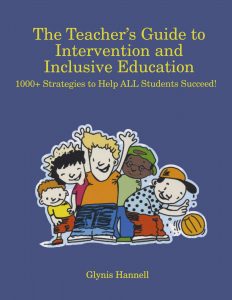
The teacher’s guide to intervention and inclusive education: 1000+ strategies to help all students succeed!
Glynis Hannell
LC1200 .H36 2015
A teacher’s guide to quickly identifying individual student’s difficulties and strengths and then target intervention directly where it is needed
Being a good teacher means identifying what each student needs to learn. Here are over 1000 strategies to help every teacher identify what every student needs. Topics include:
- Self-esteem, self-confidence, and optimism
- Strategies for developing positive attitudes toward reading
- Strategies for teaching phonics
- Strategies for working with spelling difficulties
- Strategies for working with punctuation
- Strategies for managing difficulties in recall with math
- Strategies for managing physical restlessness
- Teaming with professional colleagues
- And much more
This is a resource every teacher needs. Your students, and their parents, will thank you!
 75 ways to be a better teacher tomorrow: with less stress and quick success
75 ways to be a better teacher tomorrow: with less stress and quick success
Annette Breaux and Todd Whitaker.
ONLINE
Highly effective teachers have something in common: They do simple things extraordinarily well—simple, uncomplicated things on a daily basis.
In this new book by bestselling authors and presenters Annette Breaux and Todd Whitaker, you’ll learn the secrets of these tried-and-true techniques that will help to improve your teaching, your student’s learning, and your students’ behaviour.
Annette and Todd, who have years of experience working in schools across the globe, reveal 75 easily implemented strategies that will improve teaching, classroom management, student motivation, student achievement, parent communication, and more—with no new programs!
Each tip provides practical takeaways that can be used immediately and with remarkable success.
 17 things resilient teachers do: (and 4 things they hardly ever do)
17 things resilient teachers do: (and 4 things they hardly ever do)
Bryan Harris.
ONLINE
This book will help you learn practical ways to manage the stress of teaching and avoid burnout.
Bestselling author and educational consultant Bryan Harris presents strategies for building resilience, including reframing, understanding the power of “no”, focusing on what you can control, building positive relationships, advocating for yourself, and more.
Each chapter clearly presents concise and practical applications you can implement right away.
With this guidebook, you’ll feel ready to bounce back from challenges and stay focused on the joys of the profession.
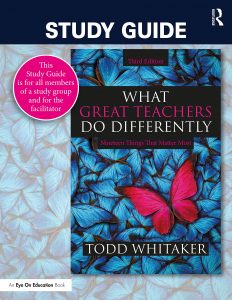 Study guide: What great teachers do differently: nineteen things that matter most
Study guide: What great teachers do differently: nineteen things that matter most
Tod Whitaker and Beth Whitaker.
ONLINE
Written to accompany the third edition of Todd Whitaker’s bestselling title, What Great Teachers Do Differently, this study guide can be used by facilitators and participants in workshops, webinars, book study groups, or other professional development events. The guide features a variety of strategies and activities that will help teachers apply the book’s concepts to their own classroom situation, so they can get the most out of the book and increase their impact in the classroom. With this study guide, teachers will have a fun, collaborative, meaningful tool to assist with professional growth
A Book Display for the Annual RECE Conference
A blog post by Tiffany Tse
On June 23-26rd, 2022, early childhood researchers, scholars, educators, pedagogues, teacher-educators, and activists gathered together for the Reconceptualizing Early Childhood Education (RECE) Conference at UBC Vancouver. The theme was “Being Together In/With Place: Reimagining Pedagogies in Transformational Times” to reflect the radical changes, uncertainties, and new connections that our world is experiencing.
Our library is featuring a book display to spotlight early childhood education, place-based learning, Indigenous connections to land, sustainability, outdoor education, and communities. Below is a list of relevant teacher resources, e-resources, board books, and fiction and nonfiction books for young children, some of which are included in the display.
Featured materials
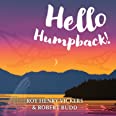 |
Hello Humpback! (2017) by Roy Henry Vickers and Robert Budd is a vibrant board book with gentle embossing for babies and toddlers to experience the animals and landscape of the Pacific West Coast through beautiful Indigenous artwork. |
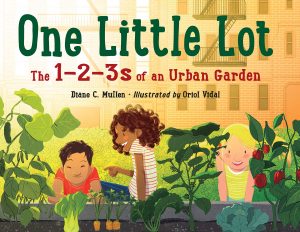 |
One Little Lot: The 1-2-3s of an Urban Garden (2020) by Diane C. Mullen and illustrated by Oriol Vidal is a colourful picture book on how an abandoned lot was transformed into a communal urban garden by the hands of a multi-cultural and multi-aged community. |
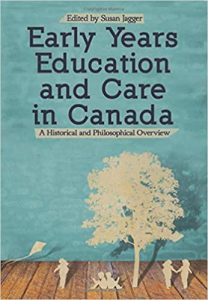 |
Early Years Education and Care in Canada: A Historical and Philosophical Overview (2019) edited by Susan Jagger compiles research from multiple perspectives on the past, present, and potential future direction of early childhood education in Canada. Themes and approaches include Indigenous ways of knowing, holistic education, play, children’s rights, diversity, and inclusion, and more. |
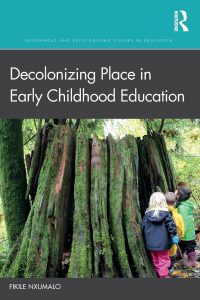 |
Decolonizing Place in Early Childhood Education (2019 eBook) by Fikile Nxumalo discusses how early childhood education can critically and pedagogically respond to environmentally damaged places, anti-blackness, and settler colonial legacies while highlighting Indigenous presences and land relations within settler colonialism. |
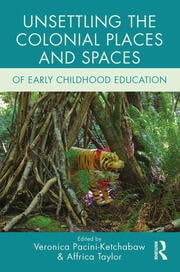 |
Unsettling the Colonial Places and Spaces of Early Childhood Education (2015 eBook) edited by Veronica Pacini-Ketchabaw and Affrica Taylor offers decolonizing strategies for early childhood practitioners and scholars. Topics include postcolonial theory, place theory, feminist philosophy, ecological humanities, and Indigenous onto-epistemologies. |
Additional resources
Board books:
- Animals of the Salish Sea: Coast Salish First Nations and Native Art illustrated by multiple Coast Salish artists with text by Melaney Gleeson-Lyall (2016)
- Sweetest Kulu by Celina Kalluk, illustrated by Alexandria Neonakis (2016)
- Plant a Kiss by Amy Krouse Rosenthal, illustrated Peter H. Reynolds (2015)
Picture books:
- Cedar: The Tree of Life by Brenda Boreham (2016)
- Cloudwalker by Roy Henry Vickers and Robert Budd (2014)
- Imagine a Place by Sarah L. Thomson, illustrated by Rob Gonsalves (2008)
- In Lucia’s Neighbourhood by Pat Shewchuk, illustrated by Marek Colek (2013)
- In Your Community by Janet Gurtler (2018)
- Look Where We Live! A First Book of Community Building by Scot Ritchie (2015)
- The Mangrove Tree: Planting Trees to Feed Families by Susan L. Roth and Cindy Trumbore, collages by Susan L. Roth (2011)
- A Stick is an Excellent Thing: Poems Celebrating Outdoor Play by Marilyn Singer, illustrated by LeUyen Pham (2012)
- Tiny, Perfect Things by M.H. Clark, illustrated Madeline Kloepper (2018)
- A Walk on the Tundra by Rebecca Hainnu and Anna Ziegler, illustrated by Qin Leng (2011)
- What Matters by Alison Hughes, illustrated by Holly Hatam (2016)
Teacher resources:
- Being the Change: Lessons and Strategies to Teach Social Comprehension by Sara K. Ahmed (2018)
- The Big Book of Nature Activities: A Year-Round Guide to Outdoor Learning by Jacob Rodenburg and Drew Monkman (2016)
- Bridging Cultures: Scientific and Indigenous Ways of Knowing Nature by Glen Aikenhead and Herman Michell (2011)
- Childhood and Postcolonization: Power, Education, and Contemporary Practice by Gaile Sloan Cannella and Radhika Viruru (2004)
- Developing as a Reflective Early Years Professional: A Thematic Approach by Carol Hayes, Jayne Daly, Mandy Duncan, Ruth Gill, and Ann Whitehouse (2014)
- Outdoor Learning Environments: Spaces for Exploration, Discovery, and Risk-taking in the Early Years by Helen Little, Sue Elliott, and Shirley Wyver (2017)
- A Pedagogy of Place: Outdoor Education for a Changing World by Brian Wattchow and Mike Brown (2011)
- The School Garden Curriculum: An Integrated K-8 Guide for Discovering Science, Ecology, and Whole-Systems Thinking by Kaci Rae Christopher (2019)
This display is on the left side of the entrance when you first come into the UBC Education Library.
We hope these resources can help you reimagine the possibilities of early childhood education and reflect on your connection with place. Our librarians would be happy to chat more about relevant books and resources with you. Feel free to contact us at ed.lib@ubc.ca.
Antiracist Pedagogy
A blog post by Hikaru Ikeda
Both a framework and a process, antiracist pedagogy is a form of Disruptive Teaching located within Critical Theory. In a perpetual state of “becoming”, antiracist pedagogical practice is lifelong and ever-evolving. Ongoing critical self-reflection, integration of learning and an anti-racist framework are needed to examine the role educational systems and teaching practices play in furthering and entrenching racism, as well as their ability and responsibility to abolish it.
As defined in Kyoko Kishimoto’s (2018) article, “Anti-Racist Pedagogy: From Faculty’s Self-Reflection to Organizing Within and Beyond the Classroom,”
Anti-racist pedagogy is not about simply incorporating racial content into courses, curriculum, and discipline. It is also about how one teaches, even in courses where race is not the subject matter. It begins with the faculty’s awareness and self-reflection of their social position and leads to application of this analysis in their teaching, but also in their discipline, research, and departmental, university, and community work. In other words, anti-racist pedagogy is an organizing effort for institutional and social change that is much broader than teaching in the classroom. (p. 540)
The Education Library recently hosted Our Stories: A Living Library of Antiracist Pedagogy. The event’s goal was to foster space for intimate learning exchanges around lived experiences of race and (anti)racism in pedagogical contexts.
Selected Books
Books to compliment the learning generated through the Living Library were on display at the Education Library. These resources may also be used to support theoretical learning and steps toward implementing and furthering antiracist pedagogy for Education Department faculty, students, teacher candidates and all who are interested.
The books cover a range of audiences and topics, including children’s and young adult literature, resources to inform professional practice in K-12 and higher education settings and teacher guides.
Click here to view a list of antiracist pedagogy resources available at the Education Library!
Resource Spotlight
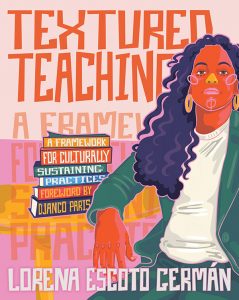 Textured teaching: a framework for culturally sustaining practices / Lorena Escoto Germán.
Textured teaching: a framework for culturally sustaining practices / Lorena Escoto Germán.
LC1099.515.C85 G47 2021
http://resolve.library.ubc.ca/cgi-bin/catsearch?bid=11944467
“Be prepared to be embraced with words, images, stories, examples, experiences, and a love for teaching in community with young people toward social and cultural justice.”—Django Paris
With Culturally Sustaining Practice as its foundation, Textured Teaching helps secondary teachers in any school setting stop wondering and guessing how to implement teaching and learning that leads to social justice. Lorena shares her framework for creating a classroom environment that is highly rigorous and engaging, and that reflects the core traits of Textured Teaching: student-driven, community centered, interdisciplinary, experiential, and flexible. Throughout the book, Lorena shares lesson design strategies that build traditional literacy skills while supporting students in developing their social justice skills at the same time. The actionable strategies Lorena uses to bring Textured Teaching values to life illuminate what is possible when we welcome all types of texts, all types of voices, and all forms of expression into the classroom.
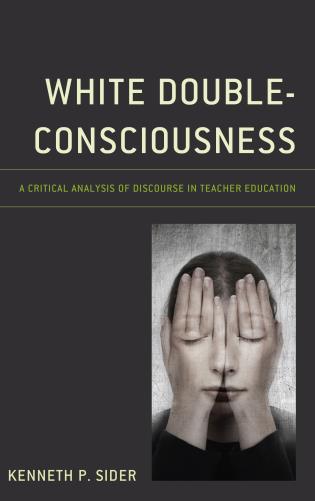 White double-consciousness: a critical analysis of discourse in teacher education / Kenneth P. Sider.
White double-consciousness: a critical analysis of discourse in teacher education / Kenneth P. Sider.
LB1707 .S57 2019
http://resolve.library.ubc.ca/cgi-bin/catsearch?bid=9915342
The complicated relationship between preservice teachers, teacher education instructional practices, and White privilege is examined in this phenomenological study, suggesting that a sense of self and pedagogical wholeness are needed for preservice teachers to become capable educators who will provide the appropriate environment and support their students will need.
.
Finding further materials in the UBC Catalogue
Try these basic strategies to begin your research in the UBC Library Catalogue.
Keyword Searches
Combine keywords relating to concepts of racial justice AND keywords about pedagogy. For example:
- Race, Racial
- Antiracism, Racism
- Justice
- Equity
- Whiteness
AND
- Pedagogy
- Teaching
- Education
- “Primary school”, “Secondary School”, “Higher Education”
Helpful Hints for Keyword Searches:
Use quotation marks to search for a specific phrase.
- Example: “Antiracist Pedagogy”, “Critical pedagogy”, “Critical whiteness studies”, “Racial justice”
Use a question mark to search for all words with the same stem.
- Example: Raci? retrieves results for Racial, Racism, Racialization, etc.
Subject Headings
Designed to help researchers find similar materials, subject headings are a tool indicating what a resource’s content is about. When you find a resource in the catalogue that supports your research, take some time to explore the subject headings listed in its catalogue record to find works with similar subject areas.
Some recommended subject headings:
Browse Catalogue > Subject begins with
Critical pedagogy.
Indigenous peoples–Education.
Racism in education.
Social justice and education.
References
Kishimoto, K. (2018). Anti-racist pedagogy: From faculty’s self-reflection to organizing within
and beyond the classroom. Race Ethnicity and Education, 21(4), 540-554.
Diversify Your Classroom Library Booklist
A blog post by Tiffany Tse
Did you know that in 2018, only 10% or fewer books were written by or about African, Asian Pacific, Latinx, or First Nations people out of 3,134 children’s books? The statistics were compiled by the Cooperative Children’s Book Center, a team of librarians at the University of Wisconsin-Madison School of Education, who have been documenting books for children and teens since 1985.

Illustration by David Huyck, in consultation with Sarah Park Dahlen. Please see full citation in References below.
Children need books that reflect their identities and experiences to feel a sense of belonging, self-worth, confidence, and to imagine a greater potential for themselves. Currently, not only do some children see few representations of themselves, but these depictions are sometimes broken, fragmented, inaccurate, or unrelatable. More literature featuring characters with accurate portrayals of various ethnicities, religions, abilities, genders, family structures, and other aspects is essential to encourage children and build empathy for others.
Dr. Rudine Sims Bishop, a well-known researcher and educator in the field of American and multicultural children’s literature, uses the analogy of “Mirrors, Windows, and Sliding Glass Doors” to express the importance of diverse books:
https://www.youtube.com/watch?v=_AAu58SNSyc
Educators and librarians can support children by providing and promoting more diverse books with a greater range of experiences and authentic representations. One of the ways to do that is by accessing books written by authors who share the same marginalized identity as their character (also known as #OwnVoices) or collaborated with underrepresented individuals or groups to uplift their community.
Although #OwnVoices should not be the only criteria for selecting diverse books nor should it be used for invalidating or outing authors, there is great value in supporting authors who share their own identity and experience with their characters through storytelling. Our Diversify Your Classroom Library booklist features fiction and non-fiction books written by diverse authors with characters of varying ethnicities, abilities, gender identities, sexual orientations, and socioeconomic statuses, many of which were written in #OwnVoices. We also included teacher resources to supplement your learning and teaching.
This booklist can be found with our other booklists in the Instructional Planning section of our Education Library website. We hope this is helpful and our librarians would be happy to chat more about diverse books with you. Feel free to contact us at ed.lib@ubc.ca.
Further resources
We understand that #OwnVoices has become less favorable due to a push for authors and content creators to justify the representation they include in their work without safety precautions for the creators in mind. Our goal is to prioritize resources that are authored by people who belong to the communities and experiences they are writing about; within this context we utilize #OwnVoices as we stand by accurate, meaningful, and respectful representations.
Annotated Bibliography on Own Voices
References
Huyck, David and Sarah Park Dahlen. (2019 June 19). Diversity in Children’s Books 2018. sarahpark.com blog. Created in consultation with Edith Campbell, Molly Beth Griffin, K. T. Horning, Debbie Reese, Ebony Elizabeth Thomas, and Madeline Tyner, with statistics compiled by the Cooperative Children’s Book Center, School of Education, University of Wisconsin-Madison: https://ccbc.education.wisc.edu/literature-resources/ccbc-diversity-statistics/books-by-about-poc-fnn/. Retrieved from https://readingspark.wordpress.com/2019/06/19/picture-this-diversity-in-childrens-books-2018-infographic/

